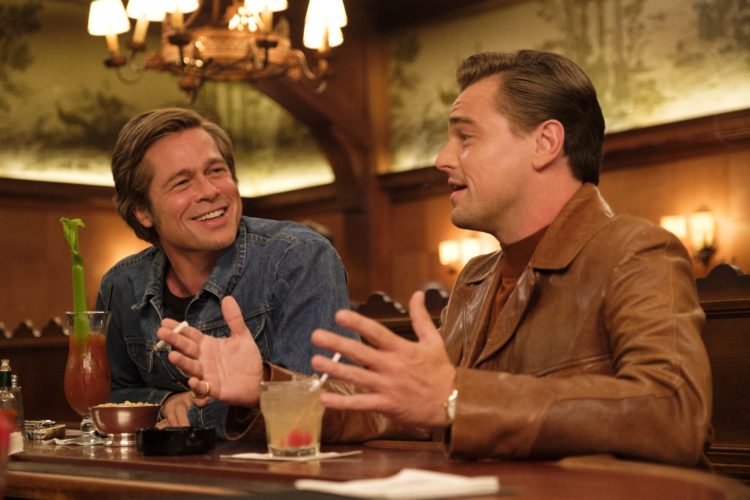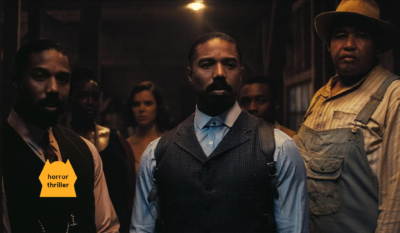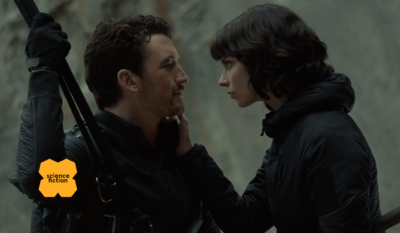Once Upon a Time in Hollywood, Quentin Tarantino's ninth film, is a romp through the Golden Age of Hollywood.
30-second review: Once Upon a Time in Hollywood is as well-made, deliciously unhinged, and entertaining as any of Quentin Tarantino's films. However, the impeccable recreation of 1969 Hollywood — from the sun-drenched cinematography to the lived-in costumes — is impeded by the thin story.
The characters, both fictional and real, played by Brad Pitt, Leonardo DiCaprio, and Margot Robbie are perfectly constructed — the performances are impeccable — but the narrative they're thrown into feels shapeless and meandering for much of the runtime. Even when the ending tries to stitch it all together. Though, every scene sticks with you in some way. It's that impact that has made Tarantino's work endure.
Where to watch Once Upon a Time in Hollywood: In theaters now.
Full review below ?

If Quentin Tarantino knows how to do one thing it's how to name characters. I mean, when you hear the name Rick Dalton you almost picture the washed-up TV cowboy that Leonardo DiCaprio plays. Though Dalton was a star burning bright for much of his career on the fictional show Bounty Law, Hollywood is a town that's always on the move and it's leaving him behind.
Like many TV stars of the era, he tried to make the pivot to movies to lesser success. In one hilarious scene, he tells the story of how he once almost played Steve McQueen's part in The Great Escape — complete with DiCaprio superimposed into clips of the film. He laments his career to his best friend, driver, and frequent stunt double Cliff Booth (played by a better than ever Brad Pitt) who has a dark reputation in town as the man who killed his wife and got away with it — which is seen in yet another vignette.
Much of the movie is spent hanging out with the duo both together and separately as Dalton films a guest role on another TV western and Booth has a friendly sparring match with Bruce Lee (Mike Moh) and encounters with a curious group of hippies (mainly Pussycat played by Margaret Qualley).
All the while, we follow young upstart Sharon Tate (Margot Robbie), her husband Roman Polanski (Rafał Zawierucha), and ex Jay Sebring (Emile Hirsch). Yes, we follow Sharon Tate during the Summer of '69 — a.k.a. the summer of the Manson murders. More on that later.
Every scene — all vignettes really — are infused with Tarantino's trademark style and sharp writing. But as one of the few of his films that isn't told in chapters, the narrative desperately needed a structure. I can't quibble with any of the scenes. They're all entertaining and some hilarious. DiCaprio is better than ever as a semi-high functioning alcoholic trying to prove to himself he can still act. But because his journey doesn't clearly fit into the larger narrative, so much of it feels pointless.

Despite the highly publicized spat between Tarantino and a reporter over the number of lines Robbie has in the film — apparently, more were added in later — Tate looms large in the film. If Dalton is a star fading, she is a star on the rise. She knows it and can't believe it. Robbie is transfixing on the screen and any fan of Tarantino's movies knows that following her for no discernible reason is going to pay off in some way — and it truly does.
The film's ending is going to be a make or break moment for audiences. It's classic Tarantino and theoretically ties the movie together. Whether or not it does is going to be subjective. Honestly, I'm not totally sure how I feel about it just yet. But ultimately, I land more positively on Once Upon a Time in Hollywood than I did his last film, The Hateful Eight, which I had a similar issue with.
Most of that is due to the fact that Tarantino is without a doubt a singular filmmaker. No one does what he does and those that try often fail — with the exception of Bad Times at the El Royale, which I loved. Each scene taken on its own is impeccably crafted and stick with you.
In one scene, Sharon Tate sits in a theater and watches her own performance in The Wrecking Crew smiling as the audience react. In another, Dalton has a conversation with a precocious 8-year-old about his career and the wringer of the film industry. And in perhaps the best sequence of the movie, Dalton attempts to make it through a scene only to flub his lines after which he gives himself an alcohol-induced pep talk which reminds us why DiCaprio is a star. Each described sound uninteresting, but the reason Tarantino has endured is his ability to give each moment impact. Even without a solid story, Once Upon a Time in Hollywood certainly sticks with you.
ADVERTISEMENT
More movies, less problems
- Jordan Peele Unleashes the First Trailer for ‘HIM'
- ‘Sinners' is the best movie of the year | movie review
- Romantic sci-fi thriller ‘The Gorge' hits its mark | movie reivew
Hey! I'm Karl. You can find me on Twitter and Letterboxd. I'm also a Tomatometer-approved critic.
💌 Sign up for our weekly email newsletter with movie recommendations available to stream.
ADVERTISEMENT
Hey, I'm Karl, founder and film critic at Smash Cut. I started Smash Cut in 2014 to share my love of movies and give a perspective I haven't yet seen represented. I'm also an editor at The New York Times, a Rotten Tomatoes-approved critic, and a member of the Online Film Critics Society.


Comments are closed.